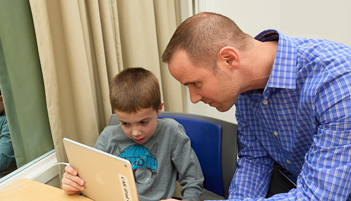HOW CAN WE HELP YOU? Call 1-800-TRY-CHOP
In This Section
New Phone App for Name Recognition to Aid Autism Screening
 By Nancy McCann
By Nancy McCann
Editor’s Note: Where Discovery Leads is a multimedia storytelling project that delves into key research themes at CHOP Research Institute. This is part two of a three-part series that focuses on novel diagnostic tools and approaches being developed under the leadership of the Center for Autism Research at CHOP. See part 1 and part 3 of this series.
A child’s diminished response to hearing his or her name has long been recognized as a red flag for autism spectrum disorder (ASD), and now researchers have developed a phone app to quantitatively measure this behavior as a way to help screen for this complex neurodevelopmental diagnosis.
Research interests in early diagnosis of ASD led Judith Miller, PhD, senior scientist and training director in the Center for Autism Research at Children’s Hospital of Philadelphia, to collaborate with the Department of Biomedical and Health Informatics at CHOP and Drexel University co-op students to develop the name recognition phone app. It helps parents collect data at home as easily as they take a picture, by simply pointing the phone’s camera at the child and calling his or her name. The app records the interaction and uploads it to a secure server for further study.
“What we found was that kids with autism responded to their name about 50 percent of the time, considerably less than children with language delays or who are typically developing (75 to 80 percent),” said Dr. Miller, who has presented her findings at conferences and will soon publish her complete results. “It’s the first tool where parents are collecting data rather than making a guess about how well their child does something.”
This would be a major shift in screening methods. The hope is that with these initial promising results, CAR researchers can enhance the app by adding other social behaviors, like imitation.
“The phone app for name recognition is very promising,” said Susan Levy, MD, MPH, founder and director of the Regional Autism Center at CHOP. “It’s not going to be the perfect screener, but in conjunction with educating pediatricians, doing better developmental surveillance, and asking the right questions, it’s closer to perfect.”


